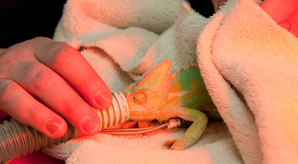Zoological Medicine
What to Expect at Your Appointment
Our goal is to offer you comprehensive veterinary medical care while providing instruction to our veterinary students, interns, and residents. Our veterinary students are an integral part of our service team, but a veterinarian will always be the one to treat your animal.
Most patients can expect the following at their appointment:
- Preparing for your appointment: Transport your pet inside of a carrier to your appointment. Many exotic pets are temperature sensitive, so consider your pet's needs when transporting them. For example, reptiles should be kept warm (you can place a warm bag of rice inside their carrier to accomplish this). Fish generally need to be kept cooler and in aerated water during transport. Portable aerators are relatively cheap and can accomplish this. Birds should be transported in a cage for the safety of the animal and other clients and animals at the hospital.
- When you arrive, a fourth-year veterinary student will meet you and your pet to escort you to the exam room.
- The student will review your pet's history with you. Depending on the type of animal and health status, the student also may perform a brief physical exam to obtain vital signs such as heart rate, respiratory rate, body temperature, and weight.
- The student then will discuss the case with the veterinarian, who then will be introduced to you.
- The veterinarian will perform a second physical examination and discuss more about the pet's care and health. The physical examination may take place in the exam room or away from the owner, since some animals become anxious when being examined around their owners.
- Following the examination, a decision for treatment or diagnostics will be discussed and made with you.
- You will be informed about the anticipated time frame involved, and can choose to wait in the examination room, in the waiting area, or leave the building for the period of time your animal is treated.
- If the treatment requires Anesthesia, you can rest assured that a dedicated anesthesiologist and anesthesia technician will use state-of-the-art monitoring equipment to administer anesthesia to your pet. This dedicated attention allows the best possible outcome in a treatment that requires anesthesia.
- Upon discharge, we will review with you what we have performed and discuss any post-treatment instructions, such as medications.
- The student working on your case will typically call you a day or two after your appointment to follow up on your pet's condition.

